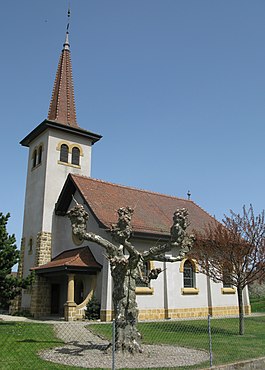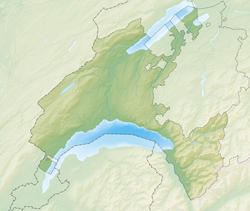Poliez-Pittet
| Poliez-Pittet | ||
|---|---|---|

Poliez-Pittet village church
|
||
|
||
| Coordinates: 46°38′N 6°41′E / 46.633°N 6.683°ECoordinates: 46°38′N 6°41′E / 46.633°N 6.683°E | ||
| Country | Switzerland | |
| Canton | Vaud | |
| District | Gros-de-Vaud | |
| Government | ||
| • Mayor | Syndic | |
| Area | ||
| • Total | 5.01 km2 (1.93 sq mi) | |
| Elevation | 743 m (2,438 ft) | |
| Population (Dec 2015) | ||
| • Total | 815 | |
| • Density | 160/km2 (420/sq mi) | |
| Postal code | 1041 | |
| SFOS number | 5533 | |
| Surrounded by | Bottens, Dommartin, Froideville, Poliez-le-Grand, Villars-Tiercelin | |
| Website |
http://www.poliez-pittet.ch Profile (French), SFSO statistics |
|
Poliez-Pittet is a municipality in the district of Gros-de-Vaud in the canton of Vaud in Switzerland.
Poliez-Pittet is first mentioned around 1160-79 as Poleto. In 1230 it was mentioned as Pollie lo Pitet.
Poliez-Pittet has an area, as of 2009[update], of 5.01 square kilometers (1.93 sq mi). Of this area, 2.75 km2 (1.06 sq mi) or 54.9% is used for agricultural purposes, while 1.79 km2 (0.69 sq mi) or 35.7% is forested. Of the rest of the land, 0.47 km2 (0.18 sq mi) or 9.4% is settled (buildings or roads).
Of the built up area, housing and buildings made up 5.0% and transportation infrastructure made up 3.4%. Out of the forested land, all of the forested land area is covered with heavy forests. Of the agricultural land, 41.9% is used for growing crops and 12.6% is pastures.
The municipality was part of the Echallens District until it was dissolved on 31 August 2006, and Poliez-Pittet became part of the new district of Gros-de-Vaud.
The municipality is located on the left bank of the Mentue river.
The blazon of the municipal coat of arms is Gules, a Roman Soldier's Head Argent, helmeted Or; chief Argent. The name Poliez is derived from Polliacus, the name of a local land owner in the Roman era.
Poliez-Pittet has a population (as of December 2015[update]) of 815. As of 2008[update], 6.2% of the population are resident foreign nationals. Over the last 10 years (1999–2009 ) the population has changed at a rate of 25%. It has changed at a rate of 15% due to migration and at a rate of 10.5% due to births and deaths.
Most of the population (as of 2000[update]) speaks French (517 or 95.2%), with German being second most common (10 or 1.8%) and Portuguese being third (6 or 1.1%). There are 3 people who speak Italian.
...
Wikipedia




